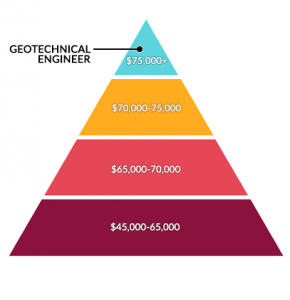More About Geotheta
More About Geotheta
Blog Article
The Geotheta Diaries
Table of ContentsTop Guidelines Of Geotheta7 Simple Techniques For GeothetaGeotheta - The FactsThe Best Strategy To Use For GeothetaThe Buzz on Geotheta

They perform site investigations, collect examples, do laboratory examinations, and analyze data to examine the suitability of the ground for building and construction projects - Engineer of Record. Based upon their searchings for, geotechnical engineers provide recommendations for structure style, incline stability, preserving structures, and reduction of geotechnical hazards. They work together with various other specialists, such as architects, architectural engineers, and construction teams, to make certain that geotechnical considerations are integrated into the general task layout and execution
By examining the actions and properties of soil and rock, they can determine potential geotechnical hazards such as landslides, soil settlement, or slope instability. Their knowledge assists protect against failures or crashes that can endanger lives and residential or commercial property. Right here are some comprehensive tasks and duties of a geotechnical designer: Website Investigation: Geotechnical designers conduct website examinations to collect data on subsurface problems.
They analyze the data to recognize the properties and habits of the dirt and rock, including their stamina, leaks in the structure, compaction qualities, and groundwater conditions. Geotechnical Analysis and Style: Geotechnical designers evaluate the information collected during site examinations to analyze the security and viability of the website for building and construction projects. They carry out geotechnical estimations and modeling to examine factors such as bearing capacity, negotiation, incline stability, lateral earth pressures, and groundwater flow.
Getting My Geotheta To Work
Foundation Design: Geotechnical designers play a crucial role in creating foundations that can safely support the designated structure. They analyze the soil problems and tons needs to identify the suitable foundation kind, such as shallow structures (e.g., footings), deep structures (e.g (https://www.pubpub.org/user/ian-hammond)., piles), or specialized techniques like dirt renovation. They consider variables such as negotiation limitations, bearing ability, and soil-structure communication to establish optimum foundation designs
They review construction strategies, screen site tasks, and carry out field evaluations to confirm that the style recommendations are adhered to. If unanticipated geotechnical issues arise, they examine the circumstance and provide suggestions for remediation or changes to the layout. Risk Analysis and Mitigation: Geotechnical engineers assess geotechnical risks and threats connected with the job site, such as landslides, liquefaction, or soil disintegration.

Cooperation and Communication: Geotechnical designers function carefully with other professionals associated with a task, such as designers, architectural designers, and construction groups. Efficient interaction and partnership are important to integrate geotechnical considerations right into the overall project design and building process. Geotechnical designers provide technical proficiency, solution questions, and guarantee that geotechnical requirements are met.
Excitement About Geotheta
Below are some kinds of geotechnical engineers: Foundation Engineer: Foundation designers concentrate on designing and assessing foundations for frameworks. They analyze the dirt problems, tons needs, and site characteristics to determine the most ideal structure type and layout, such as shallow foundations, deep foundations, or specialized methods like heap structures.
They assess the variables affecting incline security, such as dirt buildings, groundwater problems, and incline geometry, and develop techniques to avoid incline failings and alleviate risks. Earthquake Engineer: Earthquake engineers concentrate on analyzing and creating frameworks to withstand seismic pressures. They examine the seismic threat of a website, examine soil liquefaction capacity, and establish seismic design criteria to make sure the safety and security and strength of frameworks during earthquakes.
They perform area testing, collect samples, and evaluate the collected information to define the dirt properties, geologic formations, and groundwater problems at a site. Geotechnical Instrumentation Engineer: Geotechnical instrumentation designers focus on surveillance and determining the actions of soil, rock, and frameworks. They set up and preserve instrumentation systems that monitor factors such as dirt settlement, groundwater degrees, incline movements, and architectural variations to analyze performance and give early cautions of potential problems.
Geotheta Fundamentals Explained
They perform tests such as triaxial examinations, loan consolidation tests, direct shear tests, and leaks in the structure examinations to gather data for geotechnical evaluation and style. Geosynthetics Engineer: Geosynthetics engineers concentrate on the design and application of geosynthetic materials, such as geotextiles, geogrids, and geomembranes. They utilize these materials to enhance dirt stability, reinforce inclines, supply drain remedies, and control disintegration.
They often tend to be investigatory individuals, which implies they're intellectual, introspective, and investigative. They are interested, methodical, logical, analytical, and sensible. Several of them are also social, indicating they're kind, generous, participating, patient, caring, valuable, understanding, skillful, and friendly. Does this seem like you? Take our cost-free occupation test to find out if geotechnical engineer is among your top profession matches.
In the workplace atmosphere, geotechnical engineers make use of specialized software devices to perform estimations, develop styles, and analyze information. They prepare reports, review task specs, connect with clients and staff member, and coordinate job activities. The office setup supplies a conducive setting for research study, evaluation, and partnership with various other experts entailed in the task.
Geotheta for Beginners
They often see job websites to conduct website investigations, assess geotechnical conditions, and gather data for analysis. These check outs include taking a trip to different places, occasionally in remote or challenging surfaces. Geotechnical engineers might carry out soil tasting, conduct examinations, and screen building and construction activities to ensure that the geotechnical elements of the task are being implemented properly.
Geotechnical designers additionally operate in specialized geotechnical research laboratories. In these facilities, they carry out experiments, execute tests on soil and rock samples, and analyze the engineering properties of the products. Geotechnical lab designers function extensively in these environments, taking care of testing tools, operating tools, and tape-recording information. They collaborate with other research laboratory staff to make sure accurate and trusted testing results.
Report this page